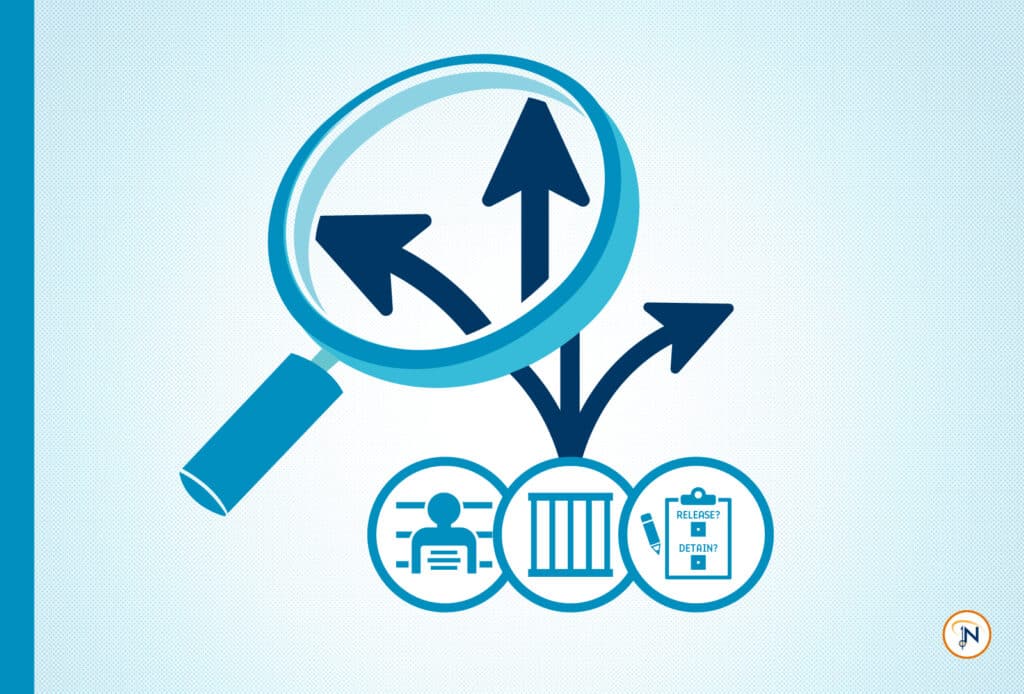Northpointe Pretrial • An equivant product
Much of the pretrial reform debate centers on one key question: Should this individual be released or detained?
However, the second-most important question is the most overlooked: How? How do we know our approach is working to deliver fair practices? If the individual is released, what pretrial services should they receive? If they’re detained, how should they be housed?
On a foundational level, pretrial supervision is the ongoing monitoring of a person from the time a court releases them from custody back into their community to the time of their trial. Courts set the terms of release, and supervision agencies across the country have systems in place to monitor people for compliance to those terms.
Several supervision options are available. While a person is on release status awaiting their court date, the most common conditions of supervision we see are:
- Partial confinement or movement restrictions — House arrest, work release, curfew, in-patient treatment, or restrictions on where the defendant is permitted to travel or move
- Residence or association restrictions — Specifies where a defendant can or cannot live and restricts contact with specifically named individuals, groups or locations
- Notice conditions — Requires the individual to notify the court of a change of address, change of employment or other substantive changes
- Possession restrictions — Prohibits defendants from possessing certain items such as firearms, firearms licenses, or controlled substances
- Crime or threat prohibitions — Specifically names the commission of a crime or the threat of a crime, like domestic violence as a violation of supervision conditions
- Employment or education requirement — Requires the individual to seek or maintain employment or enrollment in an educational program
- Treatment or testing — Drug testing, substance abuse treatment, mental health treatment, domestic violence counseling, or other medically recommended treatment
Courts are continually working to balance individual freedoms and public safety. For an interactive list of what’s being used in each state to supervise pretrial defendants, we recommend checking out the National Council of State Legislatures.
Once supervision conditions are set by the Court, the next challenge is making sure the conditions are being met. This part is never easy. There are always too many people on your caseload, too many moving pieces, and too many details requiring your attention. That’s why most agencies invest in some kind of tracking technology to help manage their pretrial cases and keep everything straight.
Without some way to track the details, there’s no way to tell if what you’re doing is working. Measurement is absolutely critical in pretrial supervision, as is tracking the actual outcomes. Did the person show up in court? Did they commit offenses while on pretrial release? Were educational or treatment programs completed? No matter what conditions were set by the court, you need to know whether they were met while the person was under your supervision: did the conditions lend to the success of the case?
When you have the right technology in place, you’ll get reminders about check-in dates and alerts when they fail to happen, instant updates on drug testing results, data about offenses that took place during pretrial supervision, and more. Your agency will be able to track and run reports on outcome data to objectively evaluate how effective your programs are, and you’ll be able to better manage your overall caseload with workload and volume tracking. And, if an individual is found guilty at trial, you’ll be able to immediately provide a full supervision report to assist with sentencing.
If you’re looking for more information about your supervision options or how to track and measure progress, give us a call. We’ve been supporting agencies like yours for over three decades, and no matter which direction the pretrial reform debates go, we’ll be here to help you make it work.






